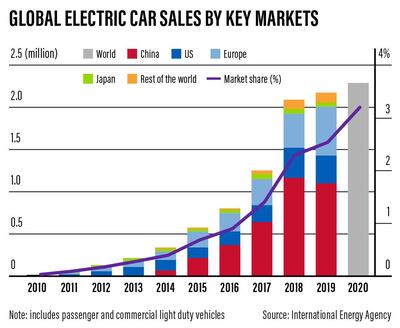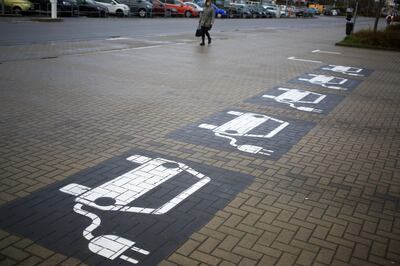It has now been five months since the World Health Organisation declared a pandemic. And as devastating as they have been, the past few months have been revealing in terms of the environment, air quality and the potential for sustainable transport. Unexpectedly, the pandemic has shaped important decisions about our future – such as the consideration of a green recovery.
A rallying call to ensure that recovery from Covid-19 is underpinned by sustainability picked up momentum across the globe, led by climate change advocates and environment agencies. Air quality was one of the main focus areas.
As countries went into lockdown, stories abounded regarding the improvement in air quality in cities. Flights were suspended and people's movements restricted. Dolphins were sighted in Venice. For the first time in years, the Himalayas were visible from cities in India. Scientists said the ozone layer had started to heal.
Given that the transportation sector is responsible for 24 per cent of direct carbon dioxide emissions, three quarters of which are because of road vehicles, as per a May 2019 International Energy Agency report, decarbonising our transport systems needs to be a priority.
Since 2016, the consultancy, research and innovation division of Bee'ah, an environmental management company, has managed seven air quality monitoring stations across Sharjah. During the lockdown phase of the pandemic, we saw a huge improvement in air quality. Levels of nitrogen dioxide decreased in Sharjah by more than 60 per cent in April compared to the previous year, when the UAE's disinfection programme and restrictions on human movement resulted in a dramatic decline in urban traffic.
At our sustainable transport venture called ION, we endorse this principle of decarbonisation. As the region’s first provider of green mobility solutions, we promote sustainable means of transport as a way to cut greenhouse emissions and improve air quality in the UAE.
The technology for this type of solution is already at hand in the form of electric vehicles and the infrastructure that supports it, such as charging stations. Electric vehicles typically produce fewer emissions than other cars. Vehicles that are completely electric produce zero direct emissions, which greatly improves urban air quality and increases standards of living.
If we want to achieve meaningful results, however, including reaching the 1.5°C target of the Paris Agreement, we need to take action on a wider scale. The European Union and China are taking the lead in promoting electric vehicles. Efforts range from subsidies, funding and tax reforms to building extensive charging station networks. Air France, for instance, was told to cut domestic flight routes that compete with high-speed trains powered by nuclear electricity or forfeit taxpayer assistance.

Here in the Middle East, the UAE can champion the further adoption of electric vehicles for public and private use. Under the UAE Vision 2021, the government is giving the electric vehicle industry a boost by providing incentives such as free parking, free charging and an exemption from toll and registration fees.
EV charging stations across Sharjah will further bolster the current network of green vehicles and ION is actively developing such stations across the emirate. Covid-19 may just be the push needed to further accelerate the use of these vehicles and reduce our emissions.
Our increased reliance on technology solutions is a phenomenon unto itself but it is relevant also to the topic at hand. During the pandemic we saw more contactless transactions, more facial recognition access systems and an increased use of robotics and remote work tools.
Recovery plans for the UAE are hinged on the digital economy, which creates room for further innovation in green car batteries and charging technology. But the plans also suggest an increased comfort with new technologies that may alleviate concerns when it comes to adapting to different and more energy efficient transport.
Economic recovery plans will no doubt create jobs and aid the development of green infrastructure. To this end, an increased demand for electric vehicles will be incentive to reduce the cost of batteries, develop charging infrastructure and also promote the manufacturing of fuel cells – devices that convert chemical energy from fuels such as hydrogen into electrical energy needed to work the car.

This would lead to the emergence of new domestic industries such as battery production and, subsequently, more jobs. The World Energy Outlook Special Report for 2020 estimates that investment in public transport systems – including the electrification of city bus systems alone – would create around 30 per cent more construction and engineering jobs.
There are plenty of other small measures that can add to progress. During the pandemic, for example, our transport venture offered its sustainable mobility solutions to the University Hospital Sharjah and Sharjah Medical District to transport doctors, medicine and test kits where needed – all with reduced emissions.
If people and organisations continue to look for sustainable solutions of getting around, we will be able to make a real difference. Despite the damage done by the pandemic, these can be promising times. Enforced transformation can help us make long-lasting changes to the way we live and to the world around us. It may not happen tomorrow but the shift to electric vehicles and cleaner carbon-neutral cities can start today.
Khaled Al Huraimel is the group chief executive of Bee’ah





